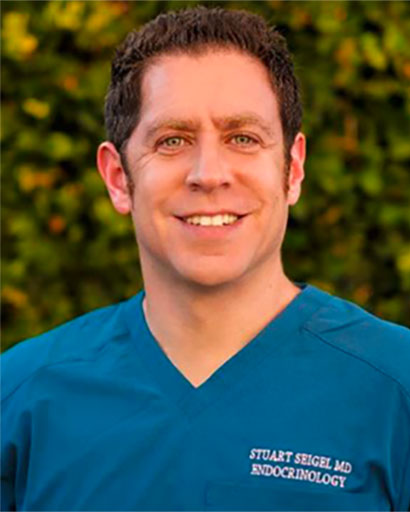Overview
What are thyroid nodules?
A thyroid nodule is a lump that forms on your thyroid, a butterfly-wing-shaped gland at the base of your throat. Nodules can be solid or filled with fluid. Most of them grow slowly, never causing symptoms or needing treatment. Nor do they affect the normal functioning of your thyroid gland. You may have nodules without even knowing it.
How common are thyroid nodules?
These nodules are very common, and about half of all Americans will have one or more by the age of 60. They are three times more common in women than men. You may need surgery to remove larger or cancerous nodules or medication for nodules that produce too much thyroid hormone.
Can thyroid nodules become cancerous?
Rarely, only about 5% of the more than three million thyroid nodules diagnosed every year become cancerous. The only reason to be concerned about nodules is if they grow large enough to interfere with swallowing or breathing, or become cancerous.
Causes
What causes thyroid nodules?
Nodules can grow on your thyroid gland for several reasons, including:
- Thyroid adenoma or overgrowth of thyroid tissue: It is not known why this occurs, but it’s not serious or cancerous. It may need treatment if it grows and bothers you, or if it causes hyperthyroidism.
- Thyroid cysts: result from adenomas that are degenerating. These cysts are rarely cancerous.
- Hashimoto’s disease: can cause thyroid inflammation, which causes nodules to grow. Long-term inflammation is linked to hypothyroidism.
- Goiter (an enlargement of the thyroid): can be caused by dietary iodine deficiency or other thyroid disorder.
- Thyroid cancer: Thyroid cancer is very rare. You should be checked by your doctor if the nodule grows large, is hard, or causes pain. A family history of thyroid or endocrine cancer, or radiation exposure, increases the risk of thyroid cancer.
- Iodine deficiency: although it’s very rare in the United States because iodine is added to salt and other foods.
Symptoms
Do thyroid nodules have symptoms?
Symptoms, including pain, are very rare. But there may be symptoms if the thyroid nodule has grown so large that it can be felt, or you notice swelling at the base of your neck.
If a large nodule (bigger than 1.5 inches) presses on your windpipe, you may have compressive symptoms that include:
- Discomfort when swallowing
- Food getting stuck in your throat
- Discomfort when you lie down, in certain positions
- A tight feeling when wearing a tight shirt collar
- Noisy breathing, especially at night
- Shortness of breath with exercise
Sometimes thyroid nodules can cause the production of too much of the thyroxine hormone. Symptoms of this overproduction (called hyperthyroidism) can include:
- Rapid or irregular heartbeat or a pounding heart
- Sudden weight loss without trying, even with a normal or increased appetite
- Trouble sleeping
- Feeling tired
- Increased sweating or heat intolerance
- Muscle weakness
- Thinning hair
- Tremor
- Anxiety, irritability, or nervousness
You should talk to your doctor if you have any of the following symptoms. It could indicate that your thyroid is not producing enough hormone, a condition called hypothyroidism.
- Frequently feeling tired
- Feeling cold, even when others are warm
- Dry skin
- Problems with memory
- Depression
- Constipation
Diagnosis
How are thyroid nodules diagnosed?
Some questions your doctor will ask are:
- Have you been exposed to radiation or a nuclear accident?
- Has anyone in your family had thyroid or endocrine cancer?
What tests are used to diagnose thyroid nodules?
A blood test will be done to check if thyroid hormone production is normal. If nodules are producing extra thyroid hormone, they may be removed to stop excess hormone production.
An ultrasound is an important tool to evaluate thyroid nodules and the lymph nodes in your neck. The ultrasound helps your doctor decide if the nodule(s) need to be biopsied. A biopsy, using a small hollow needle, removes cells from the nodule. They are examined under a microscope to look for signs of cancer. Small nodules are usually not biopsied.
Your diagnosis may be made by an endocrinologist or surgeon specializing in thyroid problems. ENTs (ears, nose, and throat doctors), internists, general surgeons, and family practice doctors can also diagnose thyroid issues.
Treatment
Do thyroid nodules require treatment?
The majority of thyroid nodules do not need treatment. Any treatment you require will be determined by the type of nodule growing on your thyroid. If you don’t have symptoms with a low risk or benign nodule, your doctor won’t recommend treatment. Instead, they may watch the nodules by using regular blood tests and ultrasounds. If the nodule grows, a biopsy may be repeated. However, if nodules don’t change over time, they rarely require any treatment.
What kind of treatment do I need for thyroid nodules?
If the nodule(s) is growing and causing problems or discomfort, your doctor may recommend surgery to remove all or part of the thyroid gland. Surgery to remove a cancerous thyroid is very successful, stopping the growth of cancer and its spread. If the thyroid is removed, you will likely be prescribed thyroid hormone to take orally to keep your body chemistry balanced.
At Inland Endocrine, we specialize in evaluating and treating diseases caused by endocrine gland issues such as thyroid nodules, thyroid cancer, hypothyroidism, and hyperthyroidism.
References
Mayo Clinic. n.d. Thyroid Nodules. Retrieved June 20, 2021, {https://www.mayoclinic.org/diseases-conditions/thyroid-nodules/symptoms-causes/syc-20355262}
Johns Hopkins Medicine. n.d. Thyroid Nodules: When to Worry. Retrieved June 20, 2021, {https://www.hopkinsmedicine.org/health/conditions-and-diseases/thyroid-nodules-when-to-worry}
Clayman, G. June 10, 2020. Thyroid Nodules. Retrieved June 20, 2021, {https://www.endocrineweb.com/conditions/thyroid/thyroid-nodules}UCLA Health. n.d. Thyroid Nodules & thyroid Cancer. Retrieved June 20, 2021, {https://www.uclahealth.org/endocrine-center/thyroid-nodules}

